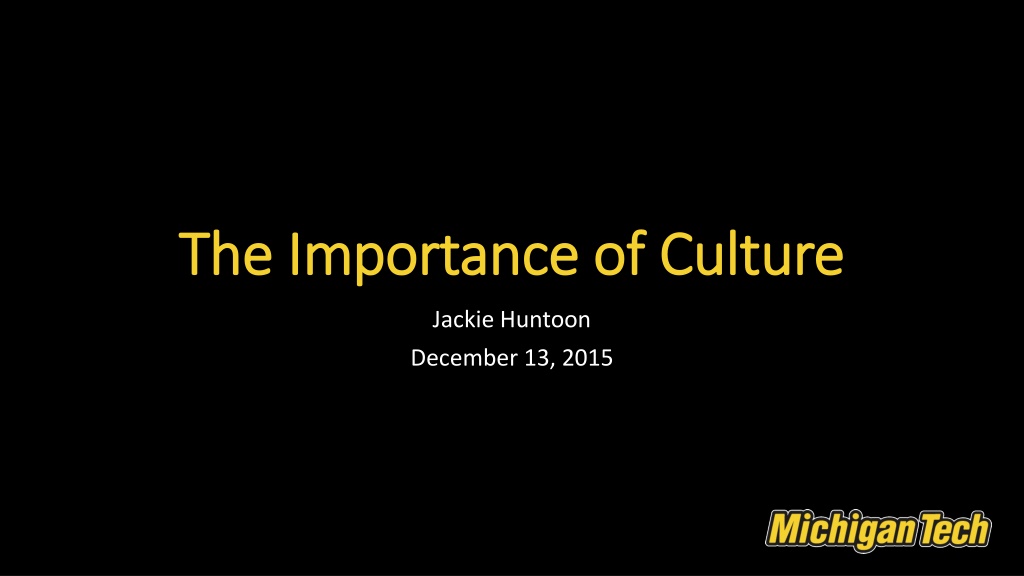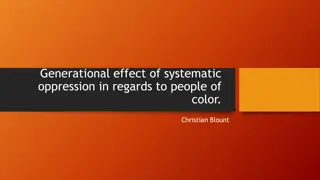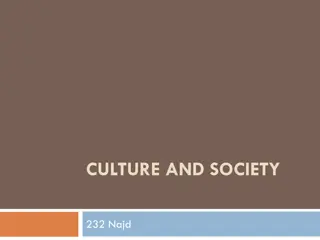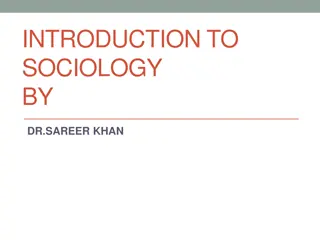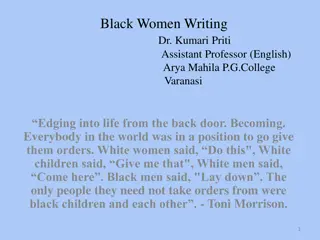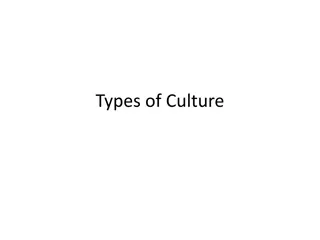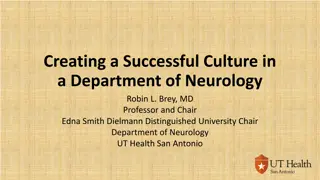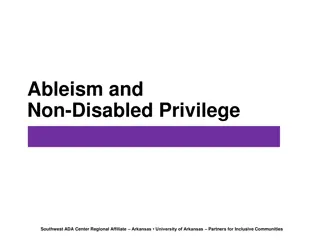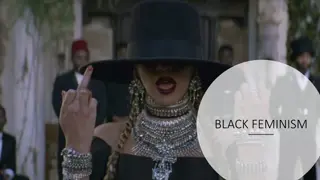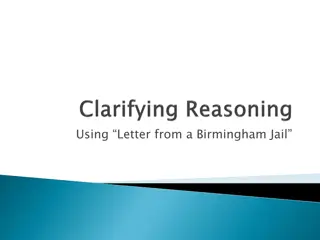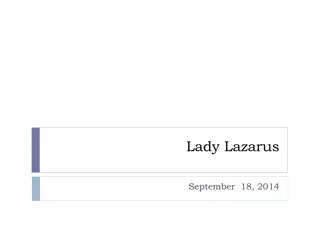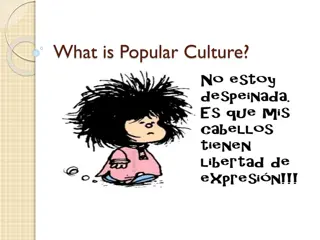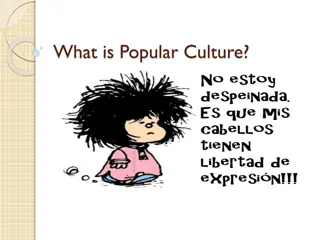Understanding Systematic Oppression in Culture and Society
Explore the intricate facets of culture and systematic oppression through compelling examples and insights from various viewpoints, shedding light on the importance of addressing racial disparities in income, education, and societal structures. The narratives highlight historical contexts and contemporary challenges faced by minority communities, emphasizing the need for collective understanding and action towards achieving equity and justice in our society.
Uploaded on Sep 18, 2024 | 0 Views
Download Presentation

Please find below an Image/Link to download the presentation.
The content on the website is provided AS IS for your information and personal use only. It may not be sold, licensed, or shared on other websites without obtaining consent from the author. Download presentation by click this link. If you encounter any issues during the download, it is possible that the publisher has removed the file from their server.
E N D
Presentation Transcript
The Importance of Culture The Importance of Culture Jackie Huntoon December 13, 2015
Why Should We Care? Why Should We Care? Aleah Hordges, WLUC-TV6 Share thoughts with people around you (anonymously).
University of Missouri University of Missouri The University of Missouri system president emerged from a fundraiser on Friday night For weeks, he had sidestepped questions about a string of racist incidents on campus. When surrounded by protesters at a homecoming parade, he had driven off. Now a group of African American students were waiting for him. Spurred on by the hunger strike of a fellow student, the small crowd peppered Wolfe with questions. As the head of their university, did he even know what systematic oppression was? I will give you an answer, and I m sure it will be a wrong answer, Wolfe said. You gonna Google it? one of the students asked sarcastically. I will give you an answer, and I m sure it will be a wrong answer, Wolfe repeated. Systematic oppression is when you don t believe that you have the equal opportunity for success . November 09, 2015, By Michael E. Miller, The Washington Post
So, What is Systematic Oppression? So, What is Systematic Oppression? Joe Feagin (2006) Systemic Racism A Theory of Oppression oppression manifested in all major societal institutions. The white founders vision of a nation of equals, stated eloquently by Virginia slaveholders like Thomas Jefferson was fatally flawed at its beginning by whites oppression of black Americans in the bloody and profitable arrangements of slavery. The country has never recovered from being founded in this extensive white-on-black oppression. substantial aspects of this racial oppression persist to the present day in a contemporary guise in the form Supreme Court Justice William O. Douglas once called slavery unwilling to die. (p xi-xii)
Fifty years later, that gulf hasnt changed much. By some measures it has widened. Economics and Race Economics and Race In 2011, the median income for black households was about fifty-nine per cent of the median income for white households, up slightly from fifty-five per cent in 1967... early in his speech, Martin Luther King, Jr., lamented that black Americans lived on a lonely island of poverty in the midst of a vast ocean of material prosperity. But when you consider wealth that is, everything a family owns, including a home and retirement savings the difference seems to have grown the median black household had about seven per cent of the wealth of its white counterpart in 2011, down from nine per cent in 1984, when a Census survey first began tracking this sort of data. Race and Poverty, Fifty Years After the March, by Vauhini Vara, August 27, 2013, The New Yorker
Economics and Education Economics and Education Many "fundamentally unequal," U.S. Education Secretary Arne Duncan said Friday, with 23 states spending more per pupil in affluent school districts than they do in high- poverty districts. school systems separate remain and What's more, Duncan said on a call with reporters, the inequality may be getting worse. Huffington Post, 03/13/2015
What Happens at College? What Happens at College? Feelings misunderstood, insulted, ignored of onlyness and of being Shaun R. Harper, in an interview with Inside Higher Ed, said that the interviews he conducts, frequently not at places experiencing the attention and protests of recent weeks, end with students and interviewers in tears, talking about isolation, stereotypes and a lack of inclusiveness. From Inside Higher Ed, November 16, 2015, By Scott Jaschik
Should we Change? Should we Change? Moral imperative/social justice Role of colleges and universities (particularly publics) in society Economic benefits of diversity
What Do We Need to Do? What Do We Need to Do? For a Start, Address: 1. Isolation 2. Stereotypes 3. Inclusion Activity: Work with a partner or group to identify at least 5 actions*you* can take (are taking) to reduce the likelihood that a student might feel isolated in your department. Be prepared to share some of your ideas with the whole group.
Stereotypes Stereotypes If Black People Said the Stuff White People Say If Black People Said the Stuff White People Say https://www.youtube.com/watch?v=A1zLzWtULig
Why do Stereotypes Matter? Why do Stereotypes Matter? Stereotype Threat Imposter Syndrome Cognitive Load
A Look at Cognitive Load due to Stereotyping A Look at Cognitive Load due to Stereotyping https://www.youtube.com/watch?v=FTYMSulvnyw
Building Inclusion Building Inclusion Remember that everyone is an individual as well as a member of multiple groups Be aware of implicit biases Be alert for microagressions Be willing to listen and change Model inclusive behavior and speak up (gently, politely) when others fail to do so
Social Tuning Social Tuning November 11, 2015, About Stacey Sinclair, associate professor of psychology and African American studies, Princeton Alumni Weekly in situations where people feel uncertain or want to be liked; they unconsciously shift their behavior to match the values of the surrounding group. Prejudice and egalitarianism are both contagious.
Handout Handout America is the land of opportunity
Microaggression Microaggression Activity Activity Pick a version (Version A or Version B). Work with a partner or group to match statements from Column A (on the left) with their possible interpretations in Column B (on the right). Be prepared to share some examples with the whole group.
Post Post- -Activity Questions Activity Questions Can you think of a situation in which you were subjected to a microagression? How did it make you feel? Can you think of a situation in which you were the perpetrator of a microagression? How did it make you feel? When people discuss microaggressions, a common response is that they are innocent acts and that the person who experiences them should let go of the incident and not make a big deal out of it. Do you agree? Do you think that the impact of subtle prejudice, such as microaggressions, may be more harmful than the impact of blatant discrimination?
Implicit Bias Activity Implicit Bias Activity The following four slides are pictures of people. We will go through the slides one-by-one and then look at all four people at the same time. Jot down your initial thoughts when we look at each person s picture on its own. When we get to the end and look at all four people together, use your notes to come up with a short story about one person (or more if there is time). Be prepared to share your responses with others and/or the whole group.
References for Handouts References for Handouts Awareness Harmony Acceptance Advocates - Breaking the Prejudice Habit http://breakingprejudice.org/teaching/group-activities/ University of California (www.ucop.edu) http://www.ucop.edu/academic-personnel- programs/_files/seminars/Tool_Recognizing_Microaggressions.pdf
One More FAST/GREAT Look at Stereotype Threat in One More FAST/GREAT Look at Stereotype Threat in Academic Settings Academic Settings https://www.youtube.com/watch?v=iOLdxZC3Yp8
